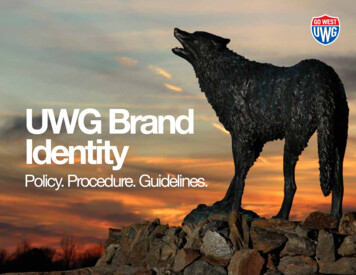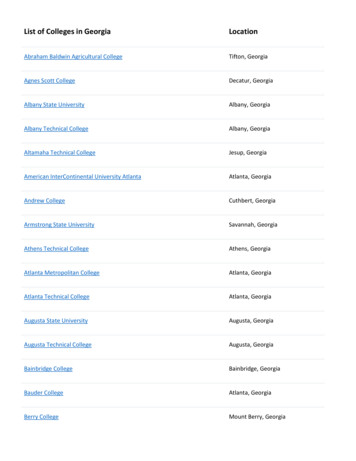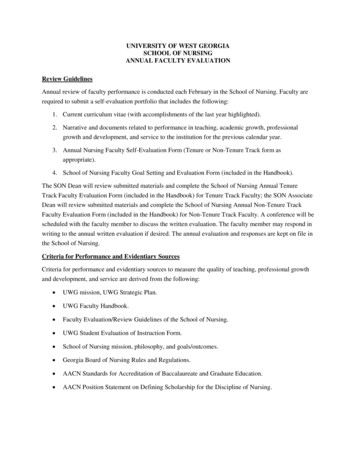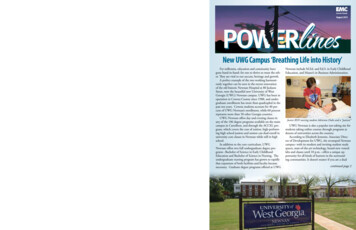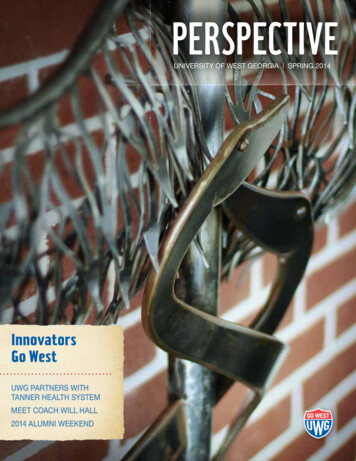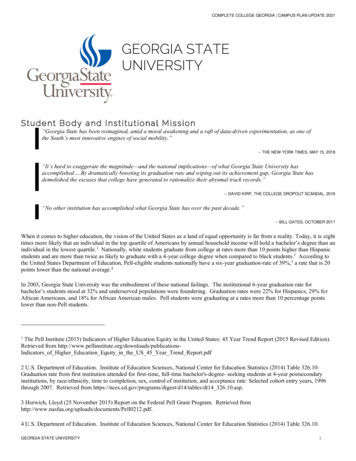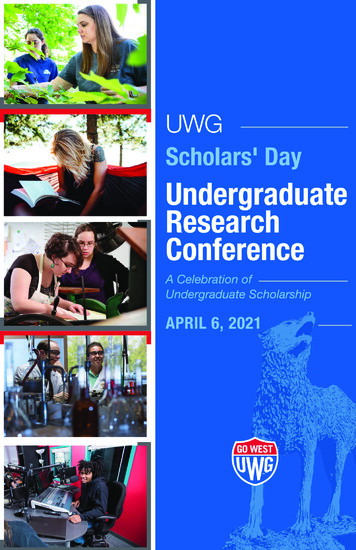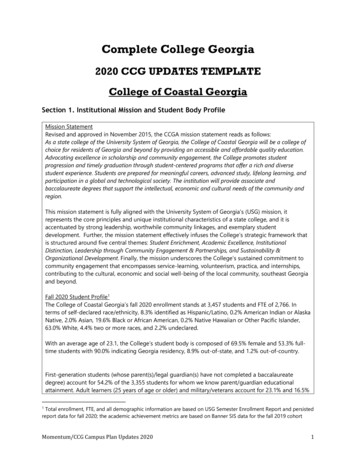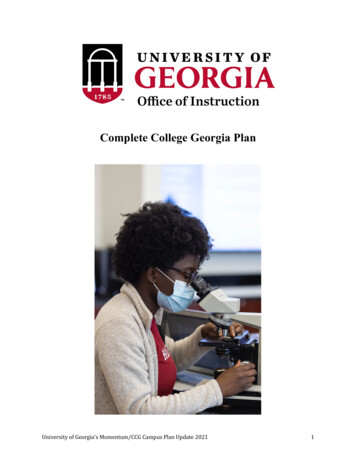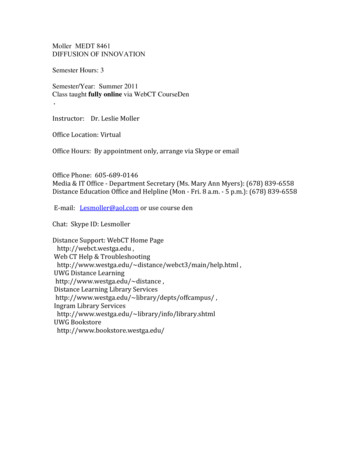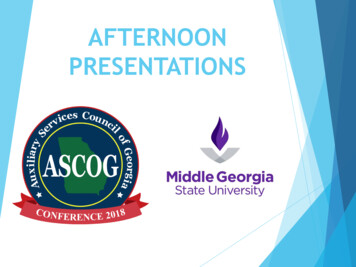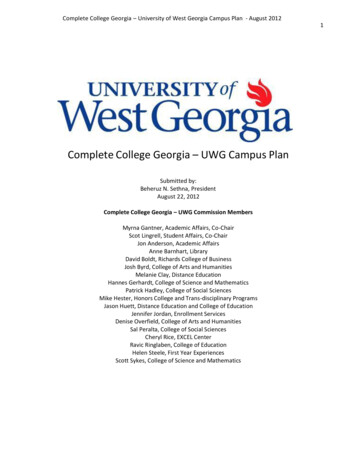
Transcription
Complete College Georgia – University of West Georgia Campus Plan - August 20121Complete College Georgia – UWG Campus PlanSubmitted by:Beheruz N. Sethna, PresidentAugust 22, 2012Complete College Georgia – UWG Commission MembersMyrna Gantner, Academic Affairs, Co-ChairScot Lingrell, Student Affairs, Co-ChairJon Anderson, Academic AffairsAnne Barnhart, LibraryDavid Boldt, Richards College of BusinessJosh Byrd, College of Arts and HumanitiesMelanie Clay, Distance EducationHannes Gerhardt, College of Science and MathematicsPatrick Hadley, College of Social SciencesMike Hester, Honors College and Trans-disciplinary ProgramsJason Huett, Distance Education and College of EducationJennifer Jordan, Enrollment ServicesDenise Overfield, College of Arts and HumanitiesSal Peralta, College of Social SciencesCheryl Rice, EXCEL CenterRavic Ringlaben, College of EducationHelen Steele, First Year ExperiencesScott Sykes, College of Science and Mathematics
Complete College Georgia – University of West Georgia Campus Plan - August 20122IntroductionCurrently, UWG is undergoing major change. Not only is the physical landscape changing because of a multitudeof capital and public/private projects, but we are also undergoing changes to achieve our goal to become adestination university—one that more students choose as their first choice. Although our mission remains thesame, through ongoing strategic planning we drafted a revised vision statement that reflects our desire to morefully affect student success. The revised vision statement integrates the concept of a learning-centered institutiondedicated to student success within the context of preparing students to be problem solvers.Stakeholder Involvement in Development of the CCG-UWG Campus PlanThis Complete College Georgia UWG (CCG-UWG) plan closely supports both our institutional mission and revisedvision. We formed the CCG-UWG Commission Soon after the March 2012 Complete College Georgia Summit bybringing together 18 influential faculty members, professional staff, and administrators from across theinstitution. Our goal was to create a coherent, strategic campus plan to affect student success and completion inthe new Complete College Georgia framework and expectations. We believe we achieved that goal.Developed with wide stakeholder input beyond the 18-member Commission, the CC-UWG campus plan builds onthe recommendations of the UWG President’s Special Commission to Improve Graduation Rates and the UWGOnline Degrees Task Force. The President’s Special Commission, which evolved from the Board of Regents’Graduation Rate Initiative, involved more than 50 faculty, staff, administrators, and students who analyzed dataand developed 60 recommendations to improve student success. These recommendations were vetted at alllevels of the institution during 2011-2012, including open Town Hall meetings and input from the Faculty Senate.Although that Commission focused mainly on the first-time, full-time, degree seeking freshman student, many ofthe 60 recommendations for improvement are relevant for the Complete College Georgia initiative.The UWG Online Degrees Task Force, formed in early 2011, involved 17 faculty and staff from across campus whodeveloped a white paper that laid out reasons to support the strategic, targeted growth of online programming.The concepts and recommendations presented in the white paper, released for review in early Fall 2011, receiveda 100% unanimous vote of support by the Faculty Senate in December, 2011, and support by the members of thePresident’s Advisory Council in February, 2012. Ideas and action items from the Online Degrees white paper’srecommendations are included in this CCG-UWG campus plan.It should be noted that UWG has been working on strategies to increase retention and graduation rates sincereceiving a 350,000 grant from the Board of Regents in 2006. As the University System’s initiatives havematured, so has the UWG response. The 2009-2010 Graduation Rate Task Force followed the work of the initial2006 grant, which was subsequently followed by the formation of the UWG President’s Special Commission toImprove Graduation Rates and its report with 60 recommendations to improve student success. The OnlineDegrees Task Force built on the outstanding work and reputation of the UWG Office of Distance Education andExtended Degree Programs to develop its seven recommendations, which align nicely with the goals of CompleteCollege Georgia to reach underserved populations.Lastly, we plan to interact with numerous external constituencies as early as October, 2012, regarding the CCUWG agenda. Examples of these groups include employers who work with UWG Career Services and who have atrack record of hiring our interns and graduates, the College of Arts and Humanities Development Council, theRichards College of Business Board of Visitors and Accounting Advisory Board, the Community AdvisoryCommittee to the College of Social Sciences, the College of Science and Mathematics Advisory Board, theUniversity Council for Educator Preparation, the Area School District Superintendent Council, and the UTeachAdvisory Board.Improvements with Current StudentsThe improvements generated by prior efforts are impressive, but we are not satisfied with them and strive to dobetter. Our 6-year graduation rate has improved more than 4 percentage points in just five years. Even more
Complete College Georgia – University of West Georgia Campus Plan - August 20123impressive is the five percentage point increase in the 4-year graduation rate between the Fall 2004 cohort andthe Fall 2007 cohort.First time, full time four and six year graduation ratesEnteredFall2000EnteredFall nteredFall 2005EnteringFreshmenN 165715571625172817011653Sixth YearN 566565513627587632GradRateFourth YearN .04%11.82%10.89%12.04%11.64%12.52%14.59%16.62%This plan will not reiterate the strategies that have brought us this far; rather, it communicates the strategies andaction steps for adding to previous successes by serving the populations identified in the Complete CollegeGeorgia initiative. Because the earlier initiatives support the goals of Complete College Georgia, the CCG-UWGCommission drew from and expanded upon their work to create this comprehensive blueprint to meet WestGeorgia’s portion of the Complete College Georgia plan. (Please see the “Matrix” in the Appendix for additionalstrategies that are not described in the body of this document).Part I: Goals and Data AnalysisUWG is a campus with a rather traditional population of students. More than 75.5% of our students are full-timeand nearly 85% of our undergraduate students are of traditional age (17-24). Therefore, we used the President’sSpecial Commission recommendations as the foundation for strategies to increase graduation with this traditionalpopulation. However, with a 15% non-traditional student base, and a CCG emphasis on this underservedpopulation, we also developed strategies to increase access and the success of adult learners. Therecommendations of the UWG Online Degrees Task Force guide our strategies for online opportunities, which inturn will serve non-traditional and underserved populations well.The Complete College UWG goal setting process was rather straightforward. Building on the data analysisgenerated for the Graduation Rates initiative, we added metrics to reflect the CCG outcome metrics that weredeveloped by the USG Metrics Working Group. These, then, informed our campus plan and guided us in thedevelopment of strategies, tactics, and action steps. In earlier efforts to improve RPG and graduation rates wedeveloped a robust set of institutional key performance indicators (KPIs). These KPIs will be considered along withthe CCG Metrics to provide information about our campus progress. The objectives, strategies, andimplementation plans in the CCG-UWG plan build on and expand existing initiatives and are grounded in datadriven, research-based approaches as well as best practices shown to enhance student success and degreecompletion.This campus plan was developed around the areas identified in both our initial data analysis and analysis of CCGmetrics generated after the CCG Summit. Areas of concern were identified and specific strategies were defined toaddress those deficiencies. Additionally, we know that the success of some strategies will be dependent ondeeper work in some areas. For instance, one of our strategies is to implement an Early Alert/Early Interventionsystem with new students. However, this strategy is dependent on a strong academic advising system. Werecognize that our advising system, although excellent in many units, could be strengthened in various ways.Thus, you will read about a strategy to improve our advising system that is broader in scope than typical strategiespresented in this plan.
Complete College Georgia – University of West Georgia Campus Plan - August 20124Key Actionable FindingsData, the hub around which all of our efforts revolved, informed each strategy and assumption in our plan. Belowwe highlight several of the key findings from our ongoing data analyses, although these are only a small portion ofthose we uncovered when working on earlier initiatives as well as the CCG-UWG plan. The attrition and academic failure of our students can be predicted from their levels of success in the firstterm and the first year. On average, more than 25% of first time students leave before the start of theirsecond year, and an additional 15-20% leave prior to their third year. Because this attrition rate isunacceptable, we decided to focus most of our strategies on the first two years. We learned that entering students in the 20-24 age bracket have the lowest retention rates (45%). Thiswill be a population for which we will develop specific strategies in the near future. UWG students earn higher DFW rates in core classes than those at our comparator institutions, whichleads to lower GPAs in the freshman year. In fact, the first-term GPA of UWG freshmen in 2009 was 2.30compared to 2.50 for Georgia Southern, 2.79 at Valdosta, and 2.81 at Kennesaw. Many of our strategiesand actions are designed to address the high DFW rate. UWG policies and procedures, at times, create unnecessary barriers to success. For instance, we have veryliberal withdraw and retake policies, such that students have unlimited withdraws. Our analysis andinvestigation of best practices suggest that limiting withdraws will help students make better decisionsabout when to withdraw and when to put in the effort to succeed in a course in which they are struggling.Changing this and other problematic policies will reduce barriers to student progression and lead tohigher graduation rates.The gaps in our knowledge and data revolve around the disaggregated populations that are represented in theCCG metrics. As a very traditional campus, we have until now focused on the first-time, full-time, degree seekingstudent. Many of the strategies that we will employ should help both the traditional freshman and the nontraditional populations of students. It is likely that we will need to adjust the delivery of these strategies based onthe targeted population.Campus Strengths and Areas of ImprovementWe identified three major strengths at UWG that will help us with our CCG-UWG goals:1. Strong working relationship between Academic Affairs and Student Affairs. The two divisions haveworked hand-in-hand to develop campus wide strategies to increase retention and graduation rates. Eachdivision has taken responsibility for the strategies and tactics within their control and createdopportunities for collaboration that have become embedded in the culture. All efforts have been cochaired by the Associate VP for Academic Affairs and Associate VP for Student Affairs with institutionalsupport from the President, Provost, and VP for Student Affairs and Enrollment Management.2. Online and distance education evidenced by the success of eCore, fully online degree programs, and onlinefaculty development. This plan relies on UWG’s expertise in online learning to help engage and assist thenon-traditional student populations that are the focus of Complete College Georgia.3. Focus on undergraduate student success in Student Affairs initiatives since 2005. We have investedheavily in best practices that produce support services for students (e.g., First Year Experiences; seeAppendix for retention data associated with First Year Programming).Because UWG has focused primarily on the traditional undergraduate, we recognize that we need to develop andimprove programs and services for non-traditional and underrepresented populations of students. Additionally,prior to working with this plan, we had not disaggregated data in ways that would allow us to develop specificstrategies for these disaggregated populations (e.g., Pell eligible, part-time students, adult learners). However,the strategies included in this plan will help both traditional and non-traditional students in all populations.
Complete College Georgia – University of West Georgia Campus Plan - August 20125Part II: Strategies and Objectives and Part III: Planning and ImplementationWe took some liberties in developing a functional format for this report by combining Part II Strategies andObjectives with Part III Planning and Implementation, as this configuration seems most beneficial to readers.Eighteen strategies are presented with a brief description, relevant metrics, approximately two action steps(objectives) per strategy, and statement of efficacy/significance. The implementation date follows the firstitalicized line that names each strategy. Measurement dates in the charts indicate the date of the first round ofdata analysis performed to determine progress with a strategy. On a final note, please view the Matrix in theAppendix for an overview of all the strategies discussed and planned for our improvement efforts. Only thosemost directly linked to access and completion are discussed in Part II and Part III.Partnerships with K-12Strategy 1 – K-12: Promote dual enrollment with K-12 students through eCore and face-to-face campus classes (Fall2012). UWG serves approximately 30 students from local high schools (mostly Carroll and Coweta Counties)through face-to-face dual enrollment programs. We expect this number to increase as Local EducationAgencies (LEAs) are rewarded through FTE dollars that are associated with increased scores on their CollegeCareer Readiness Performance Index (CCRPI), the index that replaced Adequate Yearly Progress for determiningK-12 system performance. An additional 80 high school juniors and seniors attend UWG through enrollment inour Advanced Academy. The Advanced Academy selectively recruits high ability high school juniors and seniorsfrom across the nation as well as foreign sible PersonDateNumber of dual enrollment50%30 studentsMike HesterstudentsIncrease(Fall 11)Jason HuettFall 13Number of dual enrolled students25%who matriculate to the UWGIncrease13 studentsJustin BarlowFall 13Action Step 1: Develop an intentional recruitment initiative to increase the number of dual enrollment students.Action Step 2: Create a services model that prioritizes dual enrollment students, matriculation at the University,and a focus on student success.Efficacy/Significance: Purposeful recruitment and support of high school students for dual enrollment willincrease the number of students and shorten the time to graduation.Strategy 2 – K-12: Develop a K-16 Curriculum Alignment Model to enhance college readiness (Fall 2013). Thisinitiative will be jointly led by the Provost and College of Education Dean, in collaboration with the other academicdeans and the University Council on Educator Preparation (UCEP), the newly reconfigured advisory board thatexamines educational issues at the broad policy level and makes recommendations at the implementation level.Further, we will lean on our multiple UWG – K-12 partnerships established for the Educational Leadership Degreeand Certification Program (Ed.S.), such as those with all school systems in the Northwest Georgia RegionalEducation Service Agency (RESA), West Georgia RESA, Northeast Georgia RESA, Griffin RESA; nine county systems(Gwinnett, Fulton, DeKalb, Clayton, Cobb, Rockdale, Union, Fannin, Douglas); and the Atlanta Public etsBenchmarkNumber of partnershipswith K-12 schools andIncrease by 548 systems (Educational Michael HorvathsystemsannuallyLeadership Partnerships)Dianne HoffFall 2014Action Step 1: The Provost, Academic Deans, and UCEP meet with local and regional K-12 educators fordiscussions that will lead to a K-16 Curriculum Alignment Initiative.Action Step 2: Build the number of partnerships with K-12 schools and systems that “buy in” to the K-16Curriculum Model.Efficacy/Significance: K-16 curriculum alignment will better prepare high school students for college; thus,enhancing the success rates and timely graduation. The Educational Leadership partnerships are exceptionallystrong and have the working relationships on which to build the K-16 curriculum alignment.
Complete College Georgia – University of West Georgia Campus Plan - August 20126Strategy 3 – K-12: Develop a K-16 Career Exploration/Career Development Model to expand students’ knowledgeof potential careers (Fall 2013). This initiative will be jointly led by the UWG Director of Counseling and CareerDevelopment and College of Education Dean, in collaboration with UWG career development counselors and theUniversity Council on Educator Preparation tsBenchmark48 systems(Educational LeadershipNumber of partnerships with Increase byLisa Adamspartnerships)K-12 schools and systems5 annuallyDianne HoffFall 2014Action Step 1: UCEP meets with local and regional K-12 educators to develop a K-16 Career Exploration Initiative.Action Step 2: Build the number of partnerships with K-12 schools and systems that “buy in” to the K-16Curriculum Model.Efficacy/Significance: Students who participate in integrated career development/exploration programs willidentify majors earlier and select majors that align with their strengths. These students will change majors lessfrequently, which will shorten time to graduation.Access and Completion for Underserved StudentsStrategy 4 – Access/Completion: Recruit and serve veterans and their families with appropriate support services(Fall 2012). The number of veterans attending UWG has increased 42% in the last two years, with enrollments ofveterans’ family members increasing 150% over the same time period. Support services will include, but not belimited to creating a new position in Student Affairs to serve the increasing number of veterans and familymembers on nsible Person425Cheryl Rice, Michael(250 veterans,Keim, DisabilityServices, Judith Horne,175 family)Number of veterans and family20%Spring 2012 dataShirley Lankfordmembers enrolledIncreaseFall 2013Success rates of veterans andInstitutionalfamily members (retention rate,Research andEqual tocourse completion ratio, creditsregularPlanning, Enrollmentpopulationto degree, graduation rate)ManagementFall 2012 dataFall 2014Action Step 1: Create targeted marketing through the Go West campaign to attract and recruit veterans and theirfamily members.Action 2: Form a Military Student Support Task Force, drawing members who have a special awareness ofmilitary personnel and veterans’ needs, to include faculty and staff veterans and student veterans. The taskforce will develop the necessary support services to serve veterans and their family members including properstaffing levels. (Excel Center, Counseling and Career Development, Enrollment Services).Action Step 3: Develop a UWG-Veterans Administration Educational Partnership with the new VA treatmentfacility that will open soon in Carrollton, Georgia.Efficacy/Significance: Provide enhanced access and support to veterans and their families, which will increasegraduation rates for this subpopulation of underserved adult learners.Strategy 5 – Access/Completion: Strategically increase the number and diversity of distinctive, high quality, onlineofferings, to include participation in eCore and possibly eMajor, to meet student demand and leverage institutionalstrengths (Fall 2012). As of July, 2010, the number of fully online programs, certificates, and endorsements stood atnine (graduate and undergraduate). In FY11, that number nearly doubled as a record eight new programscommitted to going online, including our first fully online bachelor’s degree (B.S. in Criminology). Recognizing thatadult populations are underserved, the UWG Online Degrees Task Force (recommendations released in February,2012) recommended the development of additional 100% online degree programs at the undergraduate level.
Complete College Georgia – University of West Georgia Campus Plan - August 20127This recommendation was made with the understanding that (1) the market clearly indicates demand fromspecific audiences, (2) programs can be delivered effectively through the online format, (3) programs will alignwith faculty expertise, and (4) resources will be allocated to meet the instructional demands and professionaldevelopment of participating faculty. This strategy is not designed to compete with our high quality face-to-faceprograms; rather, the development of targeted, fully online programs will serve adult learners who require theflexibility afforded through asynchronous online instruction.BenchmarkResponsibleMeasurementSpring 2012 DataMetricsTargetsPersonDateNumber of35 UWG Coursespartially online coursesIncrease by 20%Melanie Clay63 UWG Sections(undergraduate only)annuallyJason HuettFall 2013Spring2012DataNumber of68 UWG Coursesfully online coursesIncrease by 20%Melanie Clay106 UWG Sections(undergraduate only)annuallyJason HuettFall 201324 eCore CoursesUWG and eCore111 eCore SectionsNumber of 100% onlineundergraduate degreesIncrease by 1 annuallyas appropriate1Melanie ClayJason HuettFall 2013Action Step 1: Strategically increase the number of distinctive, high quality programs focused on adult learners.Action Step 2: Expand the work of the Online Faculty Development Center to build faculty capacity to teach intechnology-enhanced learning environments. Include training in pedagogies and tools that serve students withdisabilities well.Action Step 4: Develop an incentive system for faculty to encourage participation in the development of onlinecourses and degrees and teaching in those programs.Action Step 5: Address policies, procedures, and services to be more supportive of the fully online population.Action Step 6: Explore the possibility of offering one or more eMajor programs through the Adult LearningConsortium.Efficacy/Significance: High quality online programming, particularly 100% online degrees, will greatly facilitate thecompletion rates of adult learners. Hybrid online programming (part face-to-face and part online) can shortentime to degree for all students, as asynchronous programming ameliorates course scheduling conflicts and timedemands of working adults. This strategy will also affect the “Shorten Time to Degree” and “RestructuringInstructional Delivery” categories, but is not included in those sections for the sake of brevity.Strategy 6 – Access/Completion: Develop a partnership with West Georgia Technical College (2012-2013). Thisagreement will facilitate the transfer of students to UWG from the technical college. The agreement will givestudents who are not prepared to enter UWG as a first time freshman an opportunity to build knowledge andskills needed for successful degree completion at UWG. Further, the agreement will allow UWG studentssuspended for academic nonperformance to transfer to WGTC, regain good standing while completing anestablished course of study, and then transfer back to UWG to earn a Bachelor’s degree. The articulationagreement will be particularly useful to adult students who have been away from school for a number of yearsand could benefit from the smaller, supportive environment of the technical arkPersonDateNumber of transfer students10% increasefrom WGTC;each year117 studentsJon AndersonFall 2013Success Rates of transferstudents from WGTCEqual to the(retention rate, courseregularcompletion ratio, credits toCheryl Ricedegree, graduation rate)populationExcel CenterFall 2012 dataFall 2014
Complete College Georgia – University of West Georgia Campus Plan - August 20128Action Step 1: Create an articulation agreement to facilitate the transfer of credits.Action Step 2: Implement a directed admission program related to the articulation agreement.Efficacy/Significance: This strategy will enhance access and shorten time to degree by ensuring transfer credit.Strategy 7 – Access/Completion: Expand the “Go West” marketing campaign to target the adult learner. The GoWest campaign, which won national awards for branded television commercials and the coveted 2010Educational Advertising Awards national competition (sponsored by the Higher Education Marketing Report), hasbeen extremely successful in raising public awareness of programming at UWG and subsequent enrollments. Oneyear after the campaign began in Fall 2010, Preview Day attendance was up 24%, freshman applications andacceptances were up 5.6%, transfers increased by 8%, and financial aid applications rose by 21%. Digitalcommunications data indicate a 35% increase in visits to the institution’s website and an increase of 40% “likes”on the UWG Facebook page. These data demonstrate the power of the Go West campaign to raise awareness inthe public’s eye of educational opportunities at UWG, with subsequent nchmarkPersonDateNumber of inquiries,Double the numberInquiries equalapplications, andof inquiries,501; applicationsenrollments from adultapplications and430; enrollmentsJami Bowerpopulationenrollments231 studentsSpring 2013Justin BarlowSuccess rates of adultStatisticallylearners (retention rate,significantcourse completion ratio,improvements overcredits to degree,current successCurrent successAcademic Affairsgraduation rate)ratesratesStudent AffairsSpring 2014Number of readmits from10% increase inJustin Barlowthe “stop out” populationreadmits320 studentsSherry RobinsonSpring 2013Action Step 1: Conduct a market study to identify specific strategies to attract adult students.Action Step 2: Secure the resources to produce appropriate publications and advertisement.Action Step 3: Develop and implement the adult learner campaign.Efficacy/Significance: This strategy will enhance access and completion by getting the message out to adultlearners that UWG has outstanding programming and support services to help them complete their degrees.Strategy 8 – Access/Completion: Require enrollment in Summer Transition Program for students whose admissionsscores are in the tenth decile (Freshman Index below 2150) (Summer 2012). The Summer Transition Program is afour-week session for at-risk students to attend courses in a highly structured, highly supportive environment thatis designed to increase their success rates. Although the program is voluntary this year, it will be required in thefuture for students with a low freshman index (high school GPA and test scores), as they will be admittedprovisionally and must successfully complete the Summer Transition Program to move from provisional to regularadmission rkPersonDatePercentage of Summer TransitionProgram students gaining regularData available95%Scot LingrellSummer 2012admission statusAugust 2012Equal toPercentage of Summer TransitionregularData availableProgram retainedpopulationAugust 2013Scot LingrellSummer 2013
Complete College Georgia – University of West Georgia Campus Plan - August sBenchmarkSuccess Rates of SummerTransition Program studentsEqual to(course completion ratio, creditsregularWill vary byAcademic Affairsto degree, graduation rate)populationmetricStudent AffairsSummer 2013Action Step 1: Take necessary steps to create and implement the Summer Transition Program.Efficacy/Significance: This strategy will improve access and retention rates for students who may not otherwisehave the opportunity to attend UWG. Because test scores and socio-economic status are correlated, this programshould benefit low-income and first generation students in higher proportions than others. Further, it will helpstudents with learning disabilities.Shorten time to degree (or credits to degree)Strategy 9 – Shorten Time to Degree: Implement an Early Alert/Early Intervention system (Fall 2012). Our first yearretention data indicate that approximately 27% of FT/FT freshmen do not continue to their sophomore year. Thisloss is likely attributed to the fact that 30% of UWG freshman have first term GPAs of less than 2.00, although ourfreshman median SAT scores are higher than many of our comparator institutions. Further, our freshman first termGPA for the Fall 2011 cohort was sBenchmarkPercent of First TermReduce to 15% ofAcademic AffairsStudents with GPA 2.0students30.26%Student AffairsSpring 2013Reduce by 5%2,960 W’sAcademic AffairsCourse withdraw rateper year(Fall 2011)Student AffairsSpring 2013Increase 1.25%Academic Affairsper yearStudent AffairsFirst year retention rate73%Fall 2013Action Step 1: Identify strategies to identify students at risk of failing or dropping out early in their freshman year.Action Step
This Complete College Georgia UWG (CCG-UWG) plan closely supports both our institutional mission and revised vision. We formed the CCG-UWG Commission Soon after the March 2012 Complete College Georgia Summit by bringing together 18 influential faculty members, professional staff, and administrators from across the institution.
